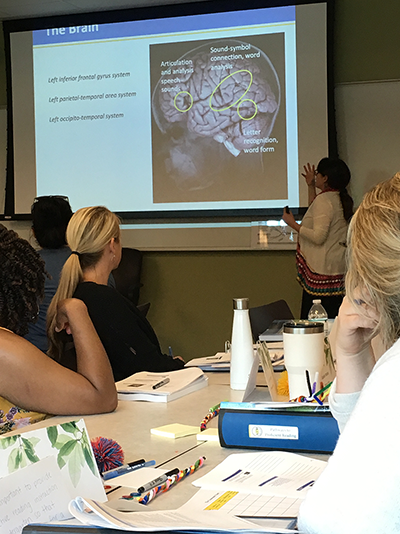Research Matters
Gaining Knowledge about Teacher’s Knowledge
 Teachers who provide direct instruction in reading are crucial in fostering reading
skills. The last newsletter shared our recently published findings from one of these
studies. The highest levels of literacy knowledge resided in educators with specialized
training. Their training included an extensive practicum. Now we are analyzing data
collected through a state Department of Education. K–2 educators completed a course
intended to increase literacy knowledge. We are examining where they exhibited the
most robust knowledge gains. Further, the educator’s knowledge links to their student’s
reading scores. We predicted educator knowledge gains will be related to student’s
growth in reading. Yet, we need future studies to capture nuanced factors — for example,
differences in classroom support and resources. These factors may impact how effectively
a teacher can share their own knowledge. A teacher’s ability to share knowledge may
impact their student’s reading skills.
Teachers who provide direct instruction in reading are crucial in fostering reading
skills. The last newsletter shared our recently published findings from one of these
studies. The highest levels of literacy knowledge resided in educators with specialized
training. Their training included an extensive practicum. Now we are analyzing data
collected through a state Department of Education. K–2 educators completed a course
intended to increase literacy knowledge. We are examining where they exhibited the
most robust knowledge gains. Further, the educator’s knowledge links to their student’s
reading scores. We predicted educator knowledge gains will be related to student’s
growth in reading. Yet, we need future studies to capture nuanced factors — for example,
differences in classroom support and resources. These factors may impact how effectively
a teacher can share their own knowledge. A teacher’s ability to share knowledge may
impact their student’s reading skills.
We also tackled teacher training from another direction this summer. We worked with two school districts and the AIM Institute for Learning and Research. We studied how instructional modality impacts gains in teacher knowledge. This study was a randomized controlled trial using three groups. All teachers completed two assessments of their knowledge of literacy. Two groups completed a training course in between the two assessments. One group of teachers attended a five-day workshop on the MTSU campus. A second group of teachers received the same course through an online platform. A third group of teachers were in a waitlist condition. These teachers completed both assessments one month apart from each other; then they started the online course. Our preliminary analyses suggest the participating teacher’s knowledge improved. Teachers who completed training performed better after training. Differences occurred in the amount of growth observed within aspects of literacy. Differences also occurred across the groups of teachers. Stay tuned to learn more about these forthcoming findings.
Tennessee Center for the Study and Treatment of Dyslexia
615-494-8880
dyslexia@mtsu.edu
@DyslexiaMTSU
@MTSUDyslexia Center
mtsudyslexia


